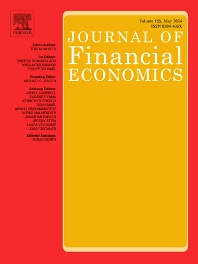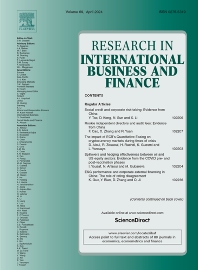Journals in Business economics
Journals in Business economics
Explore the intersection of economic theory and business practice with a wide-ranging selection of topics including market behavior, organizational strategies, and corporate finance. Supporting economists, business leaders, and students, this portfolio offers insights into competitive dynamics, innovation, and economic decision-making. Featuring cutting-edge research and real-world case studies, these resources help improve strategic planning and foster sustainable business growth.
Journal of Financial Economics
The Journal of Financial Economics (JFE) is a leading peer-reviewed academic journal covering theoretical and empirical topics in financial economics. It provides a specialized forum for the publication of research in the area of financial economics and the theory of the firm, placing primary emphasis on the highest quality analytical, empirical, and clinical contributions in the following major areas: capital markets, financial institutions, corporate finance, corporate governance, and the economics of organizations.For more information, click here.- ISSN: 0304-405X

Research in International Business and Finance
Research in International Business and Finance (RIBAF) seeks to consolidate its position as a premier scholarly vehicle of academic finance. The Journal publishes high quality, insightful, well-written papers that explore current and new issues in international finance. Papers that foster dialogue, innovation, and intellectual risk-taking in financial studies; as well as shed light on the interaction between finance and broader societal concerns are particularly appreciated. The Journal welcomes submissions that seek to expand the boundaries of academic finance and otherwise challenge the discipline. Papers studying finance using a variety of methodologies; as well as interdisciplinary studies will be considered for publication.Papers that examine topical issues using extensive international data sets are welcome. Single-country studies can also be considered for publication provided that they develop novel methodological and theoretical approaches or fall within the Journal's priority themes. It is especially important that single-country studies communicate to the reader why the particular chosen country is especially relevant to the issue being investigated.It is especially important to the Journal that authors, even of papers of an applied nature, describe and support empirical investigations within a context of a well-considered theoretical framework. Papers motived by advocacy for a new paradigmatic perspective are ideally constructed as thorough reviews that present new perspectives formed by discovering new linkages and organization of the particular topic.For all submissions, high quality, well-written papers are essential. In order to respect the time constraints of RIBAF's committed reviewers, submissions that do not meet these high standards will be returned to the authors without seeking peer review.The scope of topics that are most interesting to RIBAF readers include the following:Financial markets and institutionsFinancia... practices and sustainabilityThe impact of national culture on financeThe impact of formal and informal institutions on financePrivatization... public financing, and nonprofit issues in financeInterdiscipli... financial studiesFinance and international developmentInternati... financial crises and regulationFinanciali... studiesInternational financial integration and architectureBehavior... aspects in financeConsumer financeMethodologies and conceptualization issues related to finance- ISSN: 0275-5319
